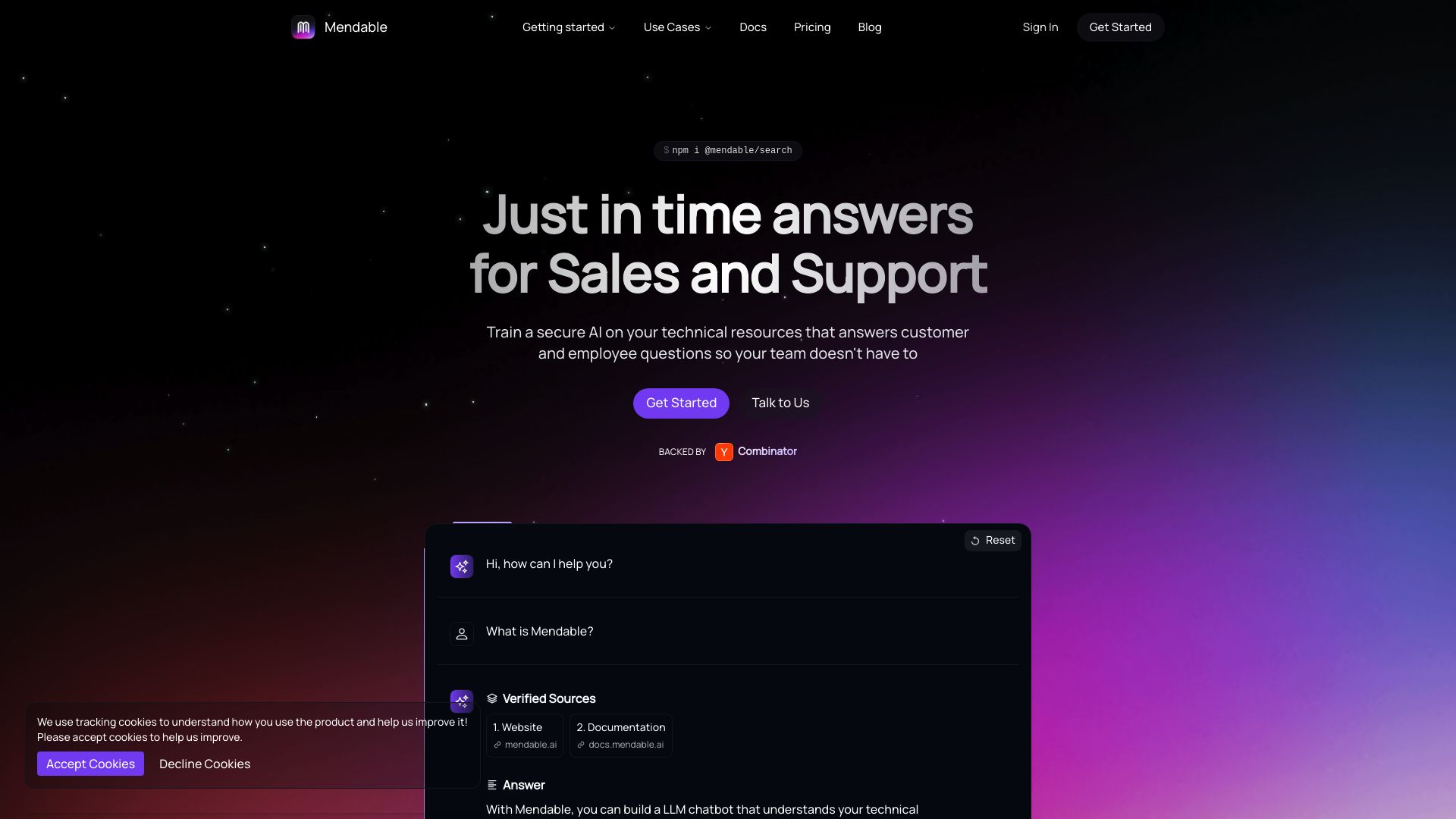Mendable vs. MetaGPT: Comparing AI Platforms for Developers
AI-powered platforms are transforming how businesses operate, create, and interact with customers. Mendable vs. MetaGPT, and SmythOS each offer unique approaches to harnessing AI’s potential. Mendable specializes in AI-driven search components, MetaGPT simulates software development teams, while SmythOS provides a comprehensive toolkit for building versatile AI agents. This comparison delves into their features, integration capabilities, and overall utility, helping developers, business leaders, and AI enthusiasts make informed decisions. We’ll explore how these platforms tackle complex tasks, enhance user experiences, and push the boundaries of AI application in real-world scenarios.
Mendable Overview
Mendable empowers developers to integrate AI-powered search capabilities into applications, enhancing user experience with intelligent information retrieval. The platform’s core offering centers on chat-powered search components that deliver contextually relevant answers based on existing documentation.


Mendable’s strength lies in its versatile integration options. Developers can leverage the platform’s API or choose from pre-built components for popular frameworks like React, Vanilla JS, and Docusaurus. This flexibility allows seamless incorporation of Mendable’s search functionality into diverse applications, from customer support portals to knowledge bases.
Mendable’s strength lies in its versatile integration options. Developers can leverage the platform’s API or choose from pre-built components for popular frameworks like React, Vanilla JS, and Docusaurus.
The platform shines in its ability to maintain context and improve response quality over time. By utilizing conversation history, Mendable’s AI adapts to user interactions, delivering increasingly accurate and relevant information. This feature proves particularly valuable for businesses seeking to provide personalized support experiences.
While Mendable excels in search capabilities, it lacks some advanced features found in comprehensive AI agent builders. The platform doesn’t offer visual builders or no-code editors, potentially limiting accessibility for non-technical users. Additionally, Mendable focuses primarily on text-based interactions, without explicit support for multimodal inputs or outputs.
Despite these limitations, Mendable’s specialized focus on AI-powered search positions it as a valuable tool for businesses aiming to enhance their documentation accessibility and user support. The platform’s ability to ingest data from various sources, including PDFs, Word files, and websites, ensures comprehensive coverage of an organization’s knowledge base.
MetaGPT Overview
MetaGPT revolutionizes multi-agent collaboration in AI by combining human Standardized Operating Procedures (SOPs) with Large Language Models (LLMs). This open-source framework, developed by researchers from prestigious institutions, simulates a software company’s structure to tackle complex tasks.


MetaGPT assigns distinct roles to AI agents, mirroring a traditional software development team. Product managers, architects, engineers, and QA testers work together, guided by SOPs that encode human workflows into prompt sequences. This approach, encapsulated in the philosophy “Code = SOP(Team),” produces coherent, high-quality outputs while minimizing errors common in multi-agent systems.
MetaGPT assigns distinct roles to AI agents, mirroring a traditional software development team… guided by SOPs that encode human workflows into prompt sequences.
The platform breaks down complex tasks into manageable subtasks, allowing specialized agents to contribute their expertise. Throughout the development process, MetaGPT generates comprehensive documentation, including requirement documents, design artifacts, and interface specifications. These intermediate outputs enhance the final code’s success rate and facilitate better human-AI interaction.
MetaGPT’s unique selling point lies in its ability to mimic and improve human collaboration within an AI framework. By incorporating SOPs and specialized roles, it ensures efficient and organized teamwork among AI agents. This approach not only improves multi-agent system performance but also opens new possibilities for AI application in complex, real-world scenarios.
However, MetaGPT has limitations. It lacks hosted agents for development and production environments, visual builders, and no-code editors. The platform also doesn’t offer features like debug mode, multimodal capabilities, or multi-agent collaboration. These constraints may impact its accessibility for users seeking a more comprehensive, user-friendly AI development environment.
Feature Comparison
Mendable and MetaGPT offer distinct approaches to AI agent development, each with its own strengths and limitations. Mendable excels in providing AI-powered search capabilities through chat components, while MetaGPT focuses on simulating software development teams using AI agents. SmythOS, however, outshines both with its comprehensive set of features for building and deploying versatile AI agents.
Unlike Mendable and MetaGPT, SmythOS provides hosted agents for both development and production environments. This feature allows seamless progression from testing to deployment, a capability absent in the other two platforms. SmythOS also offers a visual builder and no-code editor, making it accessible to users with varying levels of technical expertise. These tools simplify agent creation and customization, a significant advantage over Mendable and MetaGPT, which lack such user-friendly interfaces.
In terms of security and integration, SmythOS again demonstrates superiority. While Mendable and MetaGPT offer limited information on their security features, SmythOS provides robust data encryption, OAuth support, and IP control. SmythOS also integrates with a wide range of APIs and supports various AI models, including those from Hugging Face, offering greater flexibility and power than its competitors. This extensive integration ecosystem enables SmythOS users to create more sophisticated and adaptable AI agents, capable of handling complex, real-world scenarios across diverse applications.
Feature Comparison Table
| Mendable | MetaGPT | SmythOS | |
|---|---|---|---|
| CORE FEATURES | |||
| Hosted Agents (Dev, Production) | ❌ | ✅ | ✅ |
| Environments (Dev, Production) | ❌ | ✅ | ✅ |
| Visual Builder | ❌ | ❌ | ✅ |
| No-Code Options | ❌ | ❌ | ✅ |
| Autonomous Agents | ❌ | ✅ | ✅ |
| Debug Tools | ❌ | ✅ | ✅ |
| Multimodal | ❌ | ✅ | ✅ |
| Multi-Agent Collaboration | ❌ | ✅ | ✅ |
| Work as Team | ❌ | ✅ | ✅ |
| Agent Work Scheduler | ❌ | ✅ | ✅ |
| SECURITY | |||
| Constrained Alignment | ❌ | ✅ | ✅ |
| IP Control | ❌ | ❌ | ✅ |
| COMPONENTS | |||
| Foundation AIs | ❌ | ✅ | ✅ |
| Huggingface AIs | ❌ | ✅ | ✅ |
| Zapier APIs | ❌ | ✅ | ✅ |
| Classifiers | ❌ | ✅ | ✅ |
| Logic | ❌ | ✅ | ✅ |
| Data Lakes | ❌ | ❌ | ✅ |
| DEPLOYMENT OPTIONS (EMBODIMENTS) | |||
| Deploy as Webhook | ❌ | ✅ | ✅ |
| Staging Domains | ❌ | ❌ | ✅ |
| Production Domains | ❌ | ✅ | ✅ |
| Deploy as Scheduled Agent | ❌ | ✅ | ✅ |
| Deploy as GPT | ❌ | ✅ | ✅ |
| DATA LAKE SUPPORT | |||
| Hosted Vector Database | ❌ | ❌ | ✅ |
| Sitemap Crawler | ❌ | ❌ | ✅ |
| YouTube Transcript Crawler | ❌ | ❌ | ✅ |
| URL Crawler | ❌ | ✅ | ✅ |
Best Alternative to Mendable and MetaGPT
SmythOS emerges as the premier alternative to Mendable and MetaGPT, offering a comprehensive platform for AI agent development and deployment. Our solution combines powerful features with user-friendly design, making advanced AI capabilities accessible to users of all skill levels.
Unlike Mendable’s focus on AI-powered search or MetaGPT’s simulation of software development teams, SmythOS provides a versatile environment for creating and managing a wide range of AI agents. We offer hosted agents for both development and production, allowing seamless progression from testing to live deployment. This end-to-end support streamlines the development process and ensures consistent performance across environments.
SmythOS stands out with its intuitive visual builder and no-code options, democratizing AI development. These tools enable users to create sophisticated agents without extensive programming knowledge…
SmythOS stands out with its intuitive visual builder and no-code options, democratizing AI development. These tools enable users to create sophisticated agents without extensive programming knowledge, a significant advantage over both Mendable and MetaGPT. Our platform’s drag-and-drop interface and pre-built templates accelerate development, allowing rapid prototyping and deployment of AI solutions.
Security and integration capabilities further distinguish SmythOS. We provide robust data encryption, OAuth support, and IP control, addressing critical security concerns often overlooked by competitors. Our platform integrates seamlessly with a vast array of APIs and supports various AI models, including those from Hugging Face. This extensive ecosystem empowers users to create AI agents capable of handling complex, real-world scenarios across diverse applications.
By choosing SmythOS, users gain access to a cutting-edge platform that combines ease of use with powerful features. Our solution not only matches but exceeds the capabilities of Mendable and MetaGPT, offering unparalleled flexibility, security, and scalability for AI agent development.
Conclusion
Mendable and MetaGPT offer unique approaches to AI-powered solutions, each with distinct strengths. Mendable excels in providing AI-powered search capabilities, while MetaGPT simulates software development teams using AI agents. However, SmythOS emerges as the superior choice, offering a comprehensive platform for building and deploying versatile AI agents.
SmythOS outshines its competitors with hosted agents for both development and production environments, a feature absent in Mendable and MetaGPT. The platform’s visual builder and no-code editor make it accessible to users of varying technical expertise, simplifying agent creation and customization. This user-friendly approach sets SmythOS apart, especially when compared to the more specialized focus of Mendable and the complex framework of MetaGPT.
In terms of security and integration, SmythOS again demonstrates clear advantages. With robust data encryption, OAuth support, and extensive API integrations, SmythOS offers a level of flexibility and power that Mendable and MetaGPT struggle to match. This comprehensive ecosystem enables users to create sophisticated, adaptable AI agents capable of handling complex, real-world scenarios across diverse applications.
For businesses and developers looking to harness the full potential of AI agents, SmythOS stands out as the ideal choice. Its combination of user-friendliness, versatility, and powerful features makes it suitable for a wide range of applications, from enhancing customer support to automating complex business processes. To experience the transformative capabilities of SmythOS, create a free account and start building your AI-powered solutions today. Discover how SmythOS can revolutionize your approach to AI development and deployment, unlocking new possibilities for innovation and efficiency in your projects.
Last updated:
Disclaimer: The information presented in this article is for general informational purposes only and is provided as is. While we strive to keep the content up-to-date and accurate, we make no representations or warranties of any kind, express or implied, about the completeness, accuracy, reliability, suitability, or availability of the information contained in this article.
Any reliance you place on such information is strictly at your own risk. We reserve the right to make additions, deletions, or modifications to the contents of this article at any time without prior notice.
In no event will we be liable for any loss or damage including without limitation, indirect or consequential loss or damage, or any loss or damage whatsoever arising from loss of data, profits, or any other loss not specified herein arising out of, or in connection with, the use of this article.
Despite our best efforts, this article may contain oversights, errors, or omissions. If you notice any inaccuracies or have concerns about the content, please report them through our content feedback form. Your input helps us maintain the quality and reliability of our information.
